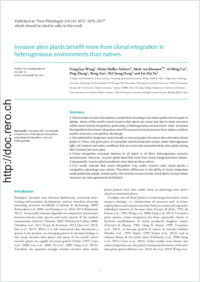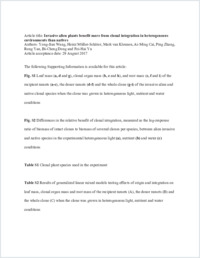Invasive alien plants benefit more from clonal integration in heterogeneous environments than natives
- Wang, Yong-Jian College of Horticulture & Forestry Sciences, Huazhong Agricultural University, Wuhan, China
- Müller-Schärer, Heinz Department of Biology, University of Fribourg, Switzerland
- Kleunen, Mark van Zhejiang Provincial Key Laboratory of Plant Evolutionary Ecology and Conservation, Taizhou University, Taizhou, China - Ecology, Biology Department, University of Konstanz, Germany
- Cai, Ai-Ming College of Horticulture & Forestry Sciences, Huazhong Agricultural University, Wuhan, China
- Zhang, Ping College of Horticulture & Forestry Sciences, Huazhong Agricultural University, Wuhan, China
- Yan, Rong College of Horticulture & Forestry Sciences, Huazhong Agricultural University, Wuhan, China
- Dong, Bi-Cheng School of Nature Conservation, Beijing Forestry University, Beijing, China
- Yu, Fei-Hai Zhejiang Provincial Key Laboratory of Plant Evolutionary Ecology and Conservation, Taizhou University, Taizhou, China
-
01.12.2017
Published in:
- New Phytologist. - 2017, vol. 216, no. 4, p. 1072–1078
clonal growth
clonal traits
invasiveness
multi-species comparison
physiological integration
resource heterogeneity
English
What confers invasive alien plants a competitive advantage over native plants remains open to debate. Many of the world's worst invasive alien plants are clonal and able to share resources within clones (clonal integration), particularly in heterogeneous environments. Here, we tested the hypothesis that clonal integration benefits invasive clonal plants more than natives and thus confers invasives a competitive advantage.We selected five congeneric and naturally co-occurring pairs of invasive alien and native clonal plants in China, and grew pairs of connected and disconnected ramets under heterogeneous light, soil nutrient and water conditions that are commonly encountered by alien plants during their invasion into new areas.Clonal integration increased biomass of all plants in all three heterogeneous resource environments. However, invasive plants benefited more from clonal integration than natives. Consequently, invasive plants produced more biomass than natives.Our results indicate that clonal integration may confer invasive alien clonal plants a competitive advantage over natives. Therefore, differences in the ability of clonal integration could potentially explain, at least partly, the invasion success of alien clonal plants in areas where resources are heterogeneously distributed.
- Faculty
- Faculté des sciences et de médecine
- Department
- Département de Biologie
- Language
-
- English
- Classification
- Biological sciences
- License
-
License undefined
- Identifiers
-
- RERO DOC 306207
- DOI 10.1111/nph.14820
- Persistent URL
- https://folia.unifr.ch/unifr/documents/306392
Other files
Statistics
Document views: 137
File downloads:
- pdf: 265
- Supplementary material: 146

